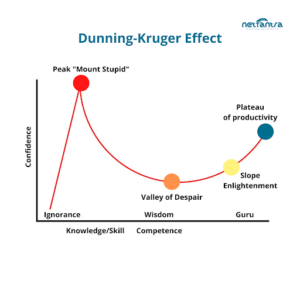In building any product or solution, the first step is about making an estimate of the effort and time required to build it. Making a good estimate ensures high satisfaction, while an incorrect estimate leads to a lot of hassle. It’s quite hard to make an accurate estimate, but you can get really close if you understand the Dunning Kruger effect.
The Dunning–Kruger effect is a cognitive bias in psychology wherein individuals with poor talents overestimate their abilities in a given activity or topic compared to objective criteria, or the peer or general performance.

It happens to everyone, especially young people who assume they know more. In truth, it’s merely the Dunning-Kruger effect at work on our egos, driving us toward reality. As a result, software developers may be fooled at various phases of their careers by their egos, leading them to believe they are exceptional and know more than they are.
The Dunning-Kruger effect can be seen in all phases of development, but it is most noticeable among beginning and advanced developers. We are all blank slates at the start of our educational journey. We build confidence in a language or system after the first learning and battling.
Then, after a few modest victories, we may feel comfortable about what we’ve learned and overestimate our sense of what we really know, leading us to underestimate the complexity of software. We don’t want to be here, and we don’t want our coworkers, employers, supervisors, or clients to be there either.
 As we acquire new skills and knowledge, we become more humble and better at analyzing and creating software systems. It’s important to remember that the developers’ journey doesn’t finish at the senior level.
As we acquire new skills and knowledge, we become more humble and better at analyzing and creating software systems. It’s important to remember that the developers’ journey doesn’t finish at the senior level.
The easiest way to prevent this is to be aware of it. We must continue studying and improving our self-awareness and confidence in what we know, while also acknowledging that we may be mistaken.

Never stop learning! Our metacognitive abilities in numerous fields will improve as we learn and gain knowledge. Speaking with specialists and/or more experienced people is a good idea. At least one expert should be assigned to each team. If full-time employment is not viable, use them only for evaluations, mentoring, and crucial decisions. Examine your own (previous) work critically.
There are several flaws in the solutions you developed two, four, or more years ago. Remember that you were confident that you had done a good job when you performed this. This way you can ensure that you are not influenced by the Dunning Kruger Effect.





Leave A Comment